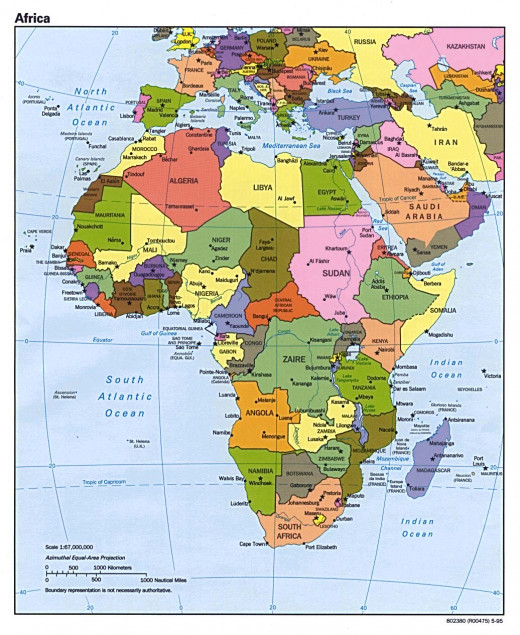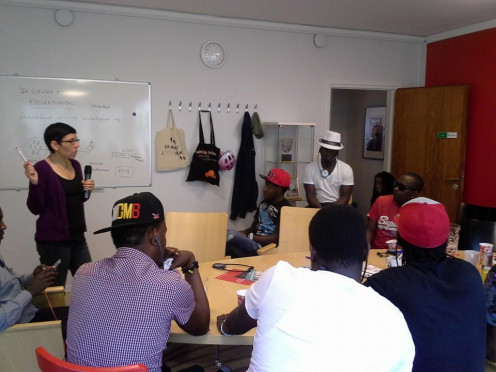Corporate Africa meets Corporate America
Africa can copy these 10 pillars of Corporate America
There are values embedded in American entrepreneurship and its high scale of productivity. By productivity is meant the number of skilled people, able to get into a form of work force, have a purchasing power and contribute to producing consumables. The values are: Thrift and Planning; Knowledge of Navigating Agency; Principles of team building and maintenance; Cognizance of Project cycles; Ability to generate largest possible beneficence; Drive for efficiency; Highly aware populace; Evolving US Foreign and Trade Policies; A really large middle class; and Focused leadership. These 10 points constitute the yeast that leavens the entrepreneurship bread of USA.This paper is the result of my research from 2013-2015 in USA. Corporate Africa can copy these value in order to behave like corporate America. The objective of this paper is to point out what distinguishes Americans as astute and competitive entrepreneurs who maintain corporate standards.
Know Your Africa

Africa's New Crop of Entrepreneurs
America is seeking to work with grass root community entrepreneurs in Africa and the bulk of Trade and Business in which people are involved is what this paper seeks to address. This paper seeks to bring on board ordinary people who don't run mega-corporations and are not involved in boardroom mega contract deals. This paper is for those individuals who together will form the largest ground swell of entrepreneurs who will be able to promote energy conservation, ford streams and bridge valleys leading in and out of their rural homes. Eventually, with infrastructure of this kind it will be possible to bring mega corporation officers who are Tech-savvy and familiar with air conditioning and coffee breaks with scones in same negotiation rooms with persons who may not be familiar with corporate world nuance and culture. In the 21st Century and beyond this potential population must have a crier who will prepare a way for them to bring their bit-coins to the Corporate wagering tables.
America has a critical number of consumers and producers in form of: poultry, horticulture, apiary, pisciculture, leather tannery, environment cleaning, environment conservation, construction, heavy machinery, specialized technology and science, heavy machinery operation, jewelry, stationery, clothing, education, informal sector, formal sector and in the skills development (vocational, business, technical, critical, analytical and practical) areas.
Quote By President Obama, July 2015
"Entrepreneurship brings down barriers between communities and cultures and builds bridges that help us take on common challenges together. Because one thing that entrepreneurs understand is, is that you don't have to look a certain way, or be of a certain faith, or have a certain last name in order to have a good idea."
President Obama at the Global Entrepreneurship Summit in Kenya, July 2015.
America will invest heavily in Africa
Is America looking at Africa patronizingly as far as doing business goes?
Africa's young entrepreneurs need to be involved and Exposed to Skills Development

The First 5 steps towards building enduring entrepreneurship Among Africans by Americans
Africa, on the other hand, has to reciprocate by positioning itself as a people centred empowerment and wealth creation continent. Eventually critical numbers to contribute to capital development will be created. Africa will eventually move out of the production style that transpired in pre-civil-war America. In order to get there, Africa has to learn the following soft standards from America:
1. Thrift and Planning
Thrift, a level of sacrifice and self-discipline, patiently weighs one's options and delays self gratification. This is planning for Institutions that last beyond the lifetime of an entrepreneur. There are practical lessons one can learn and use: Developing a wish-list; making priorities depending on cost-benefit outcomes that localizes wealth.
2. Knowledge of Navigating Agencies
Business and entrepreneurship is built on social capital as well as cash input. Understanding the world of entrepreneurship is so important. Governments that establish structures through which eligibility is assured as well as allowing consumers to navigate them helps in building investor confidence. In USA, a number of companies and agencies may be involved at federal, state, local, citizen, business, design, construction and consultant level in case of, say, road infrastructure establishment. Understand the world view psyche of the American as you work together. Imagine if you are a high-way construction representative from Africa. You need to understand what it takes for a company in Africa to do a business. Your American counterparts , who may be into road-construction, know their system well and theirs comprises of:
FEDERAL- Federal Highway Administration; US Secretary of Transportation
STATE- Department of Environmental Protection; Department of Transportation; State Inspector General
LOCAL- Building Department; Fire; Police
CITIZENS- Conservation Law Foundations; Historic Review Commission
BUSINESS- Business Roundtable
DESIGNERS- Civil Engineers; Trasport Engineers; Architects; Graphic designers
CONSTRUCTION- Project Managers; Construction Contractors; Material suppliers; Equipment suppliers; Labour; Unions
CONSULTANTS- Testing laboratories; Surveyors; Public Relations
3. TEAM AND TEAM BUILDING
There are three duties one has to engage in, in order to build a robust team. Partnering; conscious reaching out; and setting aside time to learn how others do their work. One has to be ready to create an environment for making friends. Even if it meant making friends with competitors. Any project to succeed must engage in encouraging both external and in-house team building to improve on organization, skills and motivation of persons involved. This builds confidence for all. The contract or any process language that shapes roles and responsibilities should be studied and understood. It is possible to create a culture ( rituals, values, stories and conduct) that is common. Other human aspects are shared and learned. Such teams own the vision and mission without so many complications.
4. FULL COGNIZANCE OF PROJECT
It is necessary to understand and ensure the fulfillment of project characteristics such as:
a) defined goal or objective
b) breakdown specific tasks in definable steps which become the project roadmap.
c) define a beginning and end. Defined deliverables become tangible or felt. They are the programme. A certain quantity of work will be completed according to certain specifications within a certain time frame.
d)forecasting resource consumption (Time, money, equipment, labour, materials, transportation, storage, security).
e) set aside time for interactive processes such as redesigning, reviewing and re-organization.
5. GENERATING LARGEST POSSIBLE BENEFITS
The practice of analyzing benefits and costs as a discipline rather than an option, is a business choice that opens paths to profits and welfare of individuals. This helps investors in committing capital where they will gain.
The next 5 steps in Strengthening and consolidating entrepreneurship gains
6. EFFICIENT TECHNOLOGIES AND CONSERVATION PRACTICES
Optimum use and productivity ensure that the following resources: humans; prepared plans; food; homes; work; energy; communities; culture and science are in good supply and that they promote welfare of communities.
7. MOBILIZING COMMUNITIES TOWARDS CREATIVITY AGAINST POVERTY AND STARVATION
Constructive means and designed structures against against social-ills are shaping how societies channel their contribution to development. This pattern involves people. The people are then categorised as producers or consumers. Progress, development and shifting the mindset towards creating value and opportunity for immediate individual creativity become shared goals.
8. EVOLVING US FOREIGN AND TRADE POLICIES
US is increasingly adopting a non-partisan, non-patronizing, non-ideological political approach. It is an active global leadership, promoting intellectual and social upliftment across the globe's old or new allies (e.g. Cuba and Africa). There is a shift towards reliance on social institutions such as global politics, schools, church, sports teams, hospitality entities, transport networks, chain stores and public-private enterprises to influence fair markets.
9. DEFINING AND MAINTAINING A MIDDLE CLASS STRUCTURE
Such essential services like: Educate to Innovate Campaign, is a nationwide effort to move American students back to the top in science and maths education, taking big chances on big ideas by both private and public sectors supercharged with an infusion of personal responsibility; and revisiting healthy practices are some of the key investments and mainstays keeping a robust middle class in America
10. LEADERSHIP
Pointing out clear distinctions of what leaders do and what constituents expects e.g. the expectation that one is skilled in, say, the five practices of exemplary leadership:
a) Modelling the way
b) Inspire a shared vision
c) challenging the process
d) Enabling others to act
e) Encourage the heart
Engendering commitment to planned activities:
- Find your voice by clarifying your personal values.
- Set the example by aligning actions with shared value.
- Envision the future by imagining exciting and ennobling possibilities.
- Enlist others in a common vision by appealing to shared aspirations.
- Search for opportunities by seeking innovative ways to change, grow and improve.
- Experiment and take risks by constantly generating small wins and learning from mistakes.
- Foster collaboration by promoting cooperative goals and building trust.
- Strengthen others by sharing power and discretion.
- Recognize contributions by showing appreciation for individual excellence.
- Celebrate the values and victories by creating a spirit of community.
CONCLUSION
These ten questions were formed in my mind as a result of meeting with various people in Boston, Chicago, Los Angeles, Oakland, San Jose and San Francisco. I got insights from friends at the Black and Filipino Chambers of Commerce. As someone introducing them to Africa and the opportunities this would avail to entrepreneurship, I realised there was a discordance in beliefs and values African entrepreneurs needed. We had a conference with delegates from Africa in 2014. I engaged the delegates in pointing out their understanding of what it took to do business with Americans. Some answers were vague, nebulous and sure to confuse than to cause partnerships. I developed these 10 points with the help of many friends at the African Empowered Communities-USA. This write-up is dedicated to all those African entrepreneurs who want to do business with Americans.
BIBLIOGRAPHY
1. Ellen Ruppel Shell, 2009. Cheap: High Cost of Discount Culture, Penguin Press New York.
2. Fredrick E. Gould, 2005. Managing the Construction Process: estimating, scheduling and project control. Prentice Hall, New Jersey, 2005.
3, 4, 5. Glaister Stephen, 1994. Cost Effectiveness. Cambridge University Press.
6. John Michael Greer, 2009. The Ecotechnic Future. New Society Publishers
7. Anita Roddick, 2001. Take it Personally. Conari Press.
8. i. Alonzo L. Hamby, 1992. Liberalism and its challenges. Oxford University Press.
ii. George Lakoff, Farrar, Strauss and Giroux, 2006. Communicating Our American Values and Vision. New York
iii. George Friedman, 2011. The next decade. Doubleday, New York.
9. Arianna Huffington, 2009. Third World America. Crown Publishers, New York
10. Kouzes-Posner, 2002. Leadership; the challenges. Jossey-Bass, San Francisco.







